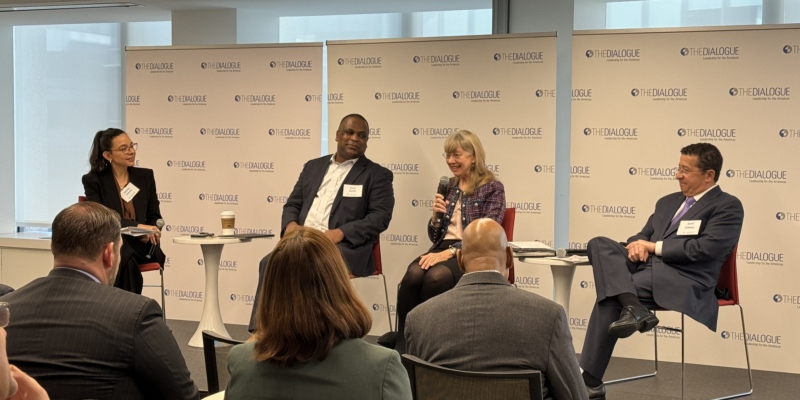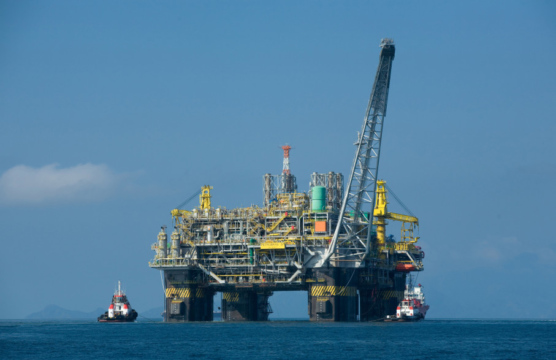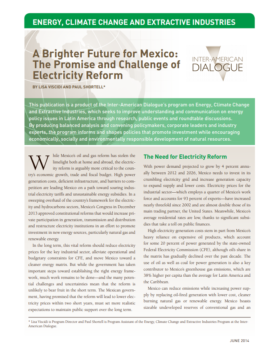Is the Caribbean Community in Danger of Collapsing?
What are Caricom’s greatest achievements? Could closer integration benefit the region and, if so, what steps would have to be taken to achieve it?
Guyana, Suriname, and Trinidad and Tobago are on the frontlines of the global political realignment in the Caribbean. The three countries are the region’s sole hydrocarbon producers, and the combination of their less-carbon intensive crude, stable political system, and cordial relationships with the United States and Europe position them as countries of critical interest in satisfying world fossil fuel demand. To better understand the role of this group of countries both globally and in the Caribbean, the Inter-American Dialogue convened a group of experts on February 29, 2024, for the event Caribbean Energy Synergies. Panelists shared insights on how Guyana, Suriname, and Trinidad and Tobago could balance their rich hydrocarbon resources with international decarbonization commitments, and how the region could navigate both Venezuela’s political maneuvering and global competition between the US and China.
To open the discussion, moderator Daniela Stevens asked panelists to give an overview of Caribbean energy, and the ability for renewables to meet-- or not meet-- islands' energy demand. David Gumbs, director of RMI’s Islands Energy Program, underscored the diversity of the Caribbean’s energy landscape. He noted that while some islands have room for improvement, some, like Barbados and Curaçao, are exemplars of low-carbon development and that renewables have large potential to meet the Caribbean’s energy demands. Vera Rechsteiner, partner at Hunton Andrews Kurth with wide experience in the Caribbean, reiterated the diversity of the region, yet noted that countries’ small sizes hamper projects to spur along their energy transition. David Goldwyn of Goldwyn Global Strategies reframed the issue, explaining how the predominant project model is designed for projects incompatible with the size of Caribbean countries and the extreme weather challenges they face, thereby failing to serve the islands.
Panelists agreed that financing is critically lacking yet differed on best ways to secure it. Panelists also agreed that to begin to speed the energy transition, Caribbean countries should adopt conducive regulatory and legal frameworks. Both Rechsteiner and Gumbs agreed that a key missing ingredient is private sector investment in local projects. Rechsteiner proposed that Caribbean countries make their public auction processes more transparent to attract private investment. Alternatively, Gumbs and Goldwyn asserted that MDBs and countries with advanced economies should pick up the slack and help buy down project costs to spur the Caribbean energy transition. However, Gumbs added the caveat that, for Caribbean states, MDBs can be slow, bureaucratic, and difficult for Caribbean islands to access, thereby complicating their ability to affect change. For Gumbs and Goldwyn, MDB’s low risk tolerance and the lack of capital in the Caribbean excludes small islands from funds that could help launch projects.
Panelists also all agreed on the need for strengthening government capacity across the Caribbean to stimulate the energy transition. Rechsteiner explained that strengthening the regulatory capacity of governments would go far to de-risk investments. Goldwyn cited Guyana as an example, explaining how their decarbonization plan falls short on delivery due to their lack of a professional bureaucracy to effectively regulate resources. Finally, Gumbs emphasized how hurricanes and natural disasters in the Caribbean can absorb government attention, leading to a lack of long-term planning and project completion.
Daniela Stevens concluded with a discussion of the geopolitics surrounding the Caribbean, specifically touching on the effects of the 2024 US election on the region. Panelists lamented the historic lack of attention given to the Caribbean by US actors. Goldwyn outlined how current US initiatives are far too small to confront the region’s issues, which leads many countries to accept debt-trap assistance from China out of necessity. However, Goldwyn importantly underscored how the Caribbean is a region where the US can help states while solidifying its influence. SIDS states, like those in the Caribbean, are the most affected by climate change, yet also the least expensive to help. Moreover, the US has a successful model—the Caspian Basin oil envoy—that could apply to the Caribbean Basin. Looking to the short term, Goldwyn emphasized that a Trump victory in 2024 could imperil US efforts in the region.
What are Caricom’s greatest achievements? Could closer integration benefit the region and, if so, what steps would have to be taken to achieve it?
Comparatively high rates of energy use in China and Brazil have led to investment in many forms of energy, including renewables.
While Mexico’s oil and gas reform has stolen the limelight, the electricity reform is more critical to the country’s economic growth.
 Inter-American Dialogue
Inter-American Dialogue

